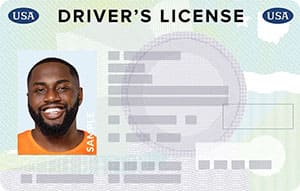What you need to know

This Idaho DMV practice test has just been updated for August 2024 and covers 40 of the most essential road signs and rules questions directly from the official 2024 ID Driver Handbook. In order to drive in Idaho, you’ll be required to pass the official ID DMV test. It’s also known as the DMV permit test, driving test, DMV written test, driver’s license test, or simply the driver’s test. You will need to take a 40-question written knowledge test if you are applying for your Idaho driver’s license for the first time, or if your Idaho driver’s license has been expired for over 25 months. The questions on the test will cover such topics as road signs, signals, symbols and markings, traffic and vehicle laws, and more. If you are over the age of 15 and you have met the requirements of Idaho’s Graduated License Program, you may receive your driver’s license after passing the knowledge test and a driving skills test. You must also provide proof of school enrollment or high school graduation (or its equivalent) to be issued a learner’s permit if you are under 18. If you are over the age of 18, you must simply pass the knowledge and skills tests to receive your license.
[faq]
FAQs
What are the requirements to obtain a learner’s permit?
In Idaho, you need to be at least 14 and a half years old, provide proof of age and identity, pass a vision test, and complete the written knowledge test to get a learner’s permit.
How many questions can I miss on the written driving test?
On the Idaho written driving test, you can miss up to 6 questions out of 40. You need to answer at least 34 questions correctly to pass.
How much does it cost to obtain a permit?
The fee for a learner’s permit in Idaho is approximately $15, but it’s recommended to check the latest fee on the Idaho Transportation Department’s website or at a local DMV office.
Can I get a driver’s license without a permit?
In Idaho, individuals under 17 must first hold a learner’s permit for at least 6 months before applying for a driver’s license. Those 17 and older can apply for a license without a learner’s permit but must pass all required tests.
Is it necessary to complete driver’s education to get a permit?
Yes, in Idaho, if you are under 17, you must complete a driver’s education course to obtain a learner’s permit. Those 17 and older are not required to complete driver’s education.
[/faq]
What to expect on the actual exam
questions
correct answers to pass
passing score
minimum age to apply
Helpful links
- Alabama
- Alaska
- Arizona
- Arkansas
- California
- Colorado
- Connecticut
- Delaware
- District Columbia
- Florida
- Georgia
- Hawaii
- Idaho
- Illinois
- Indiana
- Iowa
- Kansas
Your go-to, trusted source
Experience the Driving-Tests differenceList of questions (classic view)
- You must stop when you see a school bus
- When slowing down or stopping, you must
- Idaho’s “basic rule” law requires you to maintain a speed that is __________ at all times.
- What does this sign mean?
- Which of the following statements about Idaho speed limits on an interstate highway is correct?
- If you are approached by an emergency or police vehicle sounding a siren or flashing red or blue lights, you must _________ until the emergency vehicle has passed you.
- Passing is prohibited when you are in or approaching the following areas, except
- This sign indicates
- When parking on a public road, you must park parallel to and within ____ inches of the curb or edge of the roadway.
- If you plan to turn just beyond an intersection, when should you signal?
- Which of the following can be considered a legal parking zone?
- This sign indicates
- You must dim your headlamps 500 feet before meeting another vehicle and __________ before overtaking another vehicle.
- When you make a U-turn near a hill or curve, the law requires that you be able to see
- Backing of a vehicle is always prohibited
- What does this sign mean?
- You are driving on a freeway. If you exit at a single-point urban interchange by mistake and you wish to return to the freeway, what should you do?
- In a roundabout, drivers must __________ whether they need to make a right turn, a left turn, or a U-turn or continue forward.
- Things that can distract you from the road include
- What does this sign indicate?
- Be prepared to react promptly to emergencies by driving with your hands placed on the steering wheel at approximately
- To avoid a collision,
- For an extra margin of safety, increase the usual three-second following distance
- What does this sign indicate?
- Which of the following statements about passing a vehicle is correct?
- When driving at night, the distance you can see ahead is
- To reduce the chances of hydroplaning, you should
- This sign indicates
- To exit a freeway, you must use
- To avoid a collision, you should NOT
- Median crossovers on freeways and interstate highways are intended for use by
- What does this sign mean?
- What does a V-shaped pattern on a barricade mean?
- Which of the following is TRUE?
- When you approach a snowplow truck in winter driving, you should
- What does this sign indicate?
- When an animal moves into the path of your vehicle quickly and unexpectedly, you should
- You must allow a safe distance of at least _______ when passing a bicycle traveling in the same direction.
- You have approached an intersection with a stop sign, but no crosswalk or stop line. When is it safe for you to proceed?
- What does this sign indicate?

Clear your Challenge Bank?
This will clear your Challenge Bank and delete all questions.
This cannot be undone.

